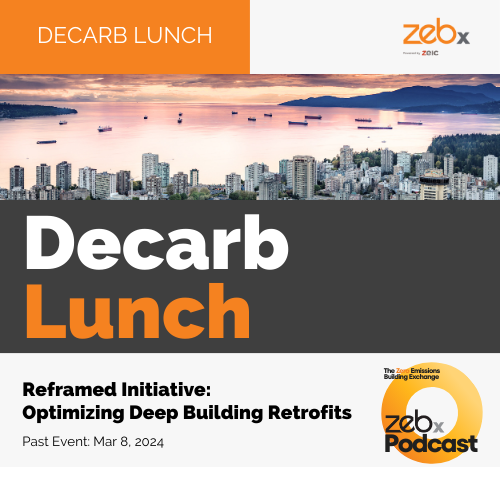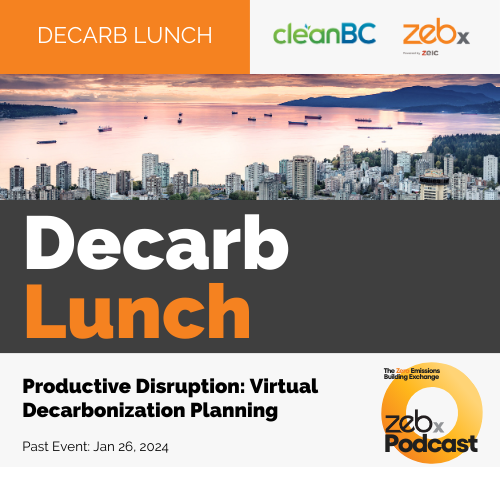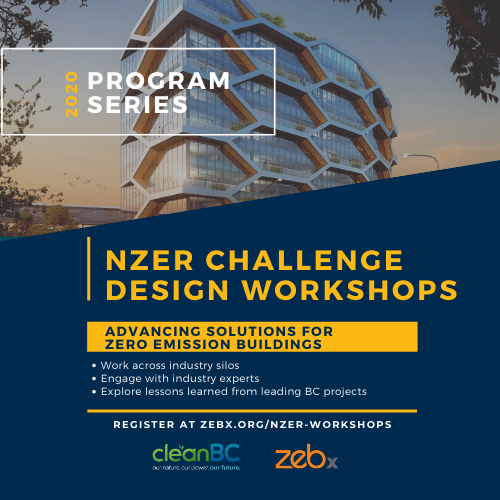
CleanBC NZER Challenge Workshops Series: Navigating to Net-Zero Energy-Ready
December 7, 2020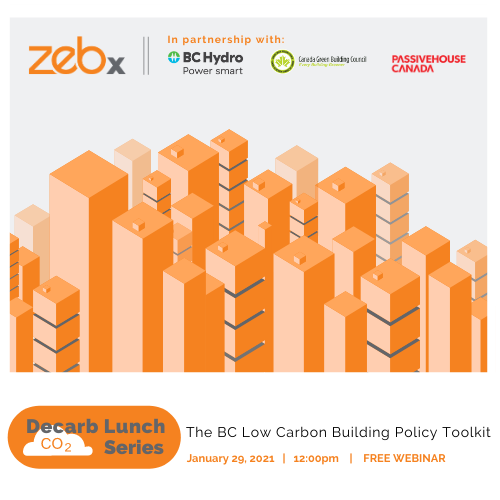
Jan 2021 Decarb Lunch: The BC Low Carbon Building Policy Toolkit
January 29, 2021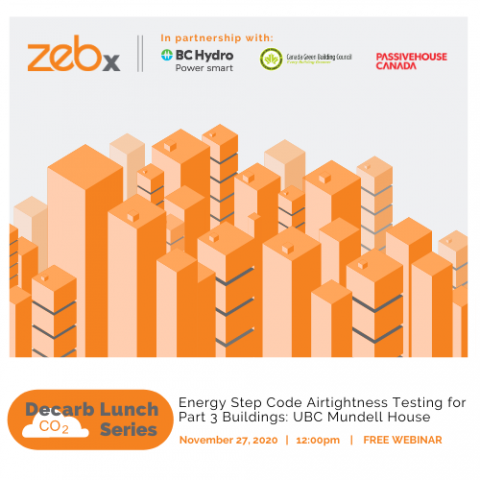
BC Energy Step Code Airtightness Testing for Part 3 Buildings: UBC Mundell House
Past Event: Nov 27 @ 12:00 pm – 1:00 pm
Overview
Whole building airtightness testing is a regulatory requirement for residential and non-residential new construction projects in British Columbia under the BC Energy Step Code. With an increased focus on airtight buildings, verification of the performance of the air barrier system is required via whole building airtightness testing to demonstrate reduced air leakage rates through the building enclosure. Improved airtightness impacts the overall energy efficiency of the building by reducing heating and cooling loads while helping to provide a comfortable indoor environment. For Part 3 buildings, it is important to plan and incorporate airtightness requirements and testing in a project’s design and construction phases.
The UBC Mundell House is a new 123,000 sq ft rental residential project with 135 units for faculty and staff comprising two linked 6-storey buildings. While the building was designed to meet an energy target through UBC’s policy, it was not designed and constructed to meet a specific BC Energy Step Code performance target. The Project Team decided to conduct an airtightness test in July 2020 to understand the building’s performance and to serve as an example for future UBC Properties Trust projects which will be required to meet the Energy Step Code.
Format
Key project team members from ZGF Architects, Ventana Construction, and Aqua-Coast Engineering will talk about the airtightness testing site preparation, testing procedures and outline lessons learned from undergoing the process. A Senior Energy Code Administrator from the Provincial Building and Safety Standards Branch will highlight testing requirements, methodologies, results reporting, and best practices that project teams should follow. This will be followed by a moderated expert panel discussion.
Speakers
Doug Bawn, Project Superintendent — Ventana Construction
Doug built his first homes in the City of Vancouver in the 1970s. Doug is a Certified Project Manager who attended the Portland Mass Timber Conference along with the CWC Carbon Lifecycle Analysis Workshop at UBC. Lean Manufacturing Principles and applying them to construction to improve quality and efficiency is one of Doug’s many passions.
Iain MacFadyen, LEED AP® BD+C, LEED AP® O+M, PMP, CPHC, Fitwel Ambassador, Principal, Lead, Building and Project Performance — ZGF Architects
Iain brings over 16 years of building performance and sustainable consulting experience gained in the UK and Canada. In his nine years in Canada, Iain has developed a number of teams in the support of tackling the sustainability requirements and goals over a range of projects. Iain is also a member of the City of Surrey Advisory Design Panel. As a certified Project Management Professional, Passive House Consultant, Fitwel Ambassador and experienced LEED practitioner, Iain has led and supported multiple building performance and sustainable project types, including large-scale residential, mixed-use, commercial, civic, institutional, and Canadian P3 projects. His relevant local experience includes Central City Master Plan (LEED ND Certification target), Central City Tower 2 (LEED Platinum Certification target), Production Way Phase 1 Office (LEED Gold Certification target), VAHA Portfolio of Four Affordable Housing Projects (all four projects targeting Passive House Certification), UBC Wesbrook Place Lot 4 (UBC REAP Gold Certification target), UBC Evolve (Passive House Certification target), UBC Lot 11 (UBC REAP Gold Plus certified), 950 Main Street Lu’ma Housing Project (NECB) and Linwood Seniors Housing (BC Energy Step Code 4).
Pat Cuthbert, P.Eng, Principal — Aqua-coast Engineering Ltd.
Pat Cuthbert is a graduate of Mechanical Engineering from the University of British Columbia and is a registered Professional Engineer in BC. Pat joined Aqua-Coast Engineering in 2010 and since then has been the Building Enclosure Engineer of Record on over one hundred projects, including three of BC’s largest Passive House certified buildings.
Scott Williams P.Eng, CPHD, LEED APBD+C, Senior Energy Codes Administrator, Building and Safety Standards Branch | Office of Housing and Construction Standards — Ministry of Municipal Affairs and Housing
Scott is a Senior Energy Codes Administrator with the Building and Safety Standards Branch and his primary focus is on the development and successful implementation of the BC Energy Step Code and the transition to net-zero energy ready buildings. With over 12 years of experience as a building enclosure engineer, Scott brings his strong technical background and passion for green building design to the development of policies and technical regulations relating to building performance and the BC Building Code.


